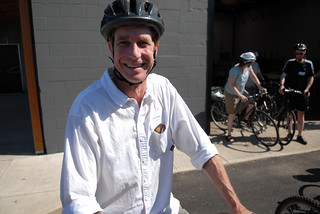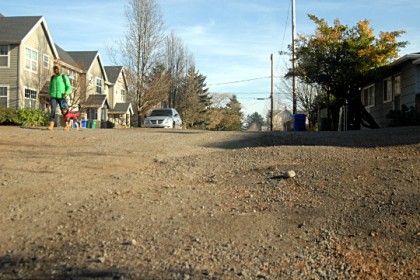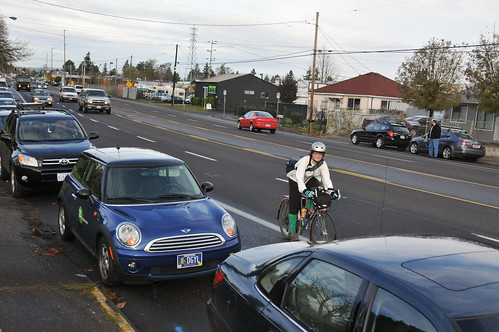An idea that’s spent six years in City Hall’s back rooms is bubbling back up: a fee on each Portland household, and probably businesses too, that could pay for street paving, sidewalks, streetcars and protected bike lanes.
If approved by city council — or possibly by a public vote — it’d buttress Oregon’s sagging gasoline tax as a way to maintain and improve the city’s $15 billion transportation system starting as soon as late 2015, supporters say.
It’d also, of course, shift the costs of maintaining the street system further away from the cars, trucks and buses that actually damage the streets, and toward the public in general.
But backers, who include many biking advocates, say a universal fee is more politically feasible than raising fees on motor vehicles. And, unlike the gas tax, the state constitution wouldn’t forbid it from being used for public transit or off-street paths.
Though the city has been circumspect in its public statements, four members of the Portland Bureau of Transportation’s budget advisory committee said this week that based on what they’ve heard from city staff and from one another, a universal street fee looks like the plan.
“You could have a pretty low rate across the board in Portland and generate quite a bit of money,” said Jeanne Harrison, a neighborhood association volunteer in Northwest Portland who sits on the committee.
“You own a house, you pay. You rent a house, you pay. You rent an apartment, you pay. You rent a business that generates a lot of car trips, you pay. I think it’s something that makes a lot of sense.”
— David Sweet, Cully Neighborhood Association
In 2007, former Portland mayor Sam Adams pushed strongly for “Safe, Sound and Green Streets” — a fee initiative that would have charged each Portland household $4.54 per month, plus a variable fee on local businesses, with discounts available for low-income households and those that minimized car use. It would have raised $24 million per year, about half as much as the city now gets from gas tax and 10 percent of the agency’s current budget.
David Sweet, another budget advisory committee member who’s active in Northeast Portland’s Cully Neighborhood, also likes the idea of a street fee.
“The city is way behind on infrastructure and it’s just unworkable, the amount that PBOT relies on federal grants and state grants to do the basic work of maintaining a transportation system in the city,” he said.
The city would need $153 million a year for 10 years “to bring the bulk of our transportation assets — pavement, bridges, traffic signals and streetlights — into fair or better condition,” spokesman Dylan Rivera said Wednesday.
Sweet, who said he’s a daily bike commuter who also drives a car, added that a street fee “would help us give the lie to the idea that people who ride bikes don’t pay for streets.”
“You own a house, you pay,” he said. “You rent a house, you pay. You rent an apartment, you pay. You rent a business that generates a lot of car trips, you pay. I think it’s something that makes a lot of sense.”
The fee might be tweaked to different levels for different households and businesses based on actual or average car use patterns.
Corky Collier, who sits on the committee and represents freight and trucking interests as director of the Columbia Corridor Association, also said a utility fee seems to be the leading option in the city’s conversation.
“I think people are considering restarting that idea of a utility fee similar to what we proposed” in 2007, he said. But Collier said that though he’s “fine” with “the concept of the utility fee,” he thinks the city should first focus on advocating for a new transportation funding system at the state level that would replace the gas tax with something like a weight-based fee on vehicle miles traveled.

list is needed to justify a per-household fee.
(Photo by J.Maus/BikePortland)
“It’s possible to do a utility fee and gas tax change at the same time. but they need to be coordinated,” Collier said. He also said he thinks the city should draw up a list of projects that it wants to build — something he mentioned could be done in a few months — rather than just raising money for its own sake.
“You say, ‘I’m not trying to get new funding, I’m trying to get this pedestrian crossing built,'” Collier said.
He warned that there’d be a public backlash if the city spends the money on “dumb” projects.
“If you go too fast and if you make the wrong decisions, the public’s going to see that and then the next time you want something, you’re screwed,” he said.

(Photo by M.Andersen/BikePortland)
Other possibilities the committee has discussed include a local gas tax (tested by a poll last summer, then sidelined); higher parking-meter prices in high-demand areas; and a citywide fee for the right to park a vehicle on a public street.
“You just say the word ‘tax’ and that’s sort of a hot button for people,” Harrison said. “I think people get the concept of a user fee more easily: the idea that if you’re using something, you pay for it.”
Sweet said a residential parking fee (in Chicago, for example, it costs $50 per year to park on a public street) is “a possibility” but would require “a long-term education program” that Portland hasn’t tackled yet.
Demand-based parking meters, like the ones that currently raise hourly prices near Jeld-Wen Field from $1.80 to $3.50 during soccer games, might be a likelier option, Sweet said.
“The smart meters are all connected through computer and they’re capable of determining when a certain area is parked up,” Sweet said. “It passes 85 percent use and at that point your rates might go up. The utilization goes down and your rates go down.”
A street fee, though, has the virtue of being relatively common in the region.
“Eighteen Oregon cities already pay,” Sweet noted.
As many Portlanders will remember, this isn’t the first time a transportation fee has been seriously discussed — in fact, it wouldn’t even be the first time the city council has approved one. In 2008, after a year of twisting negotiations, city commissioners passed a plan like this and then rapidly repealed it after a group of local gas stations, convenience stores and national petroleum companies unexpectedly threatened to sponsor a signature drive that would have put the fee to a public vote.
Harrison said she doesn’t think the same would happen again.
“This time, the business community and the citizens are all on the same page in terms of funding,” she said. “Our budget advisory committee is made up of a very diverse group of people, and we’re all saying the same thing.”
Time will tell.
Correction 12/12: An earlier version of this post misstated the price of an annual street parking pass in Chicago.


